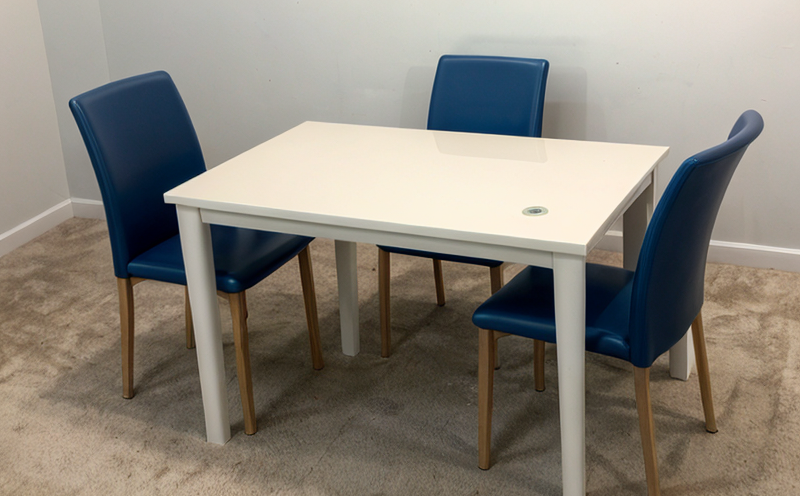ISO 11443 Rheological Properties Testing of Furniture Plastics
The ISO 11443 standard is a pivotal tool in the evaluation of rheological properties for furniture plastics. This testing method provides detailed insights into how these materials behave under various shear stresses, which is essential for ensuring product quality and safety across multiple sectors including automotive, medical, and consumer goods. For furniture manufacturers specifically, understanding the rheological behavior helps in optimizing material selection to enhance durability, comfort, and overall performance.
The testing process involves several key steps that ensure accuracy and reliability. Specimens are prepared according to ISO 11443 guidelines, which include specific dimensions and orientations tailored for accurate measurement of shear viscosity and flow behavior. The rheometer used in this procedure must be capable of precise control over temperature, rotation rate, and applied force.
Understanding the rheological properties allows manufacturers to predict how a material will perform under real-world conditions such as high pressure during manufacturing or varying temperatures throughout its lifecycle. This predictive capability is crucial for improving product design and reducing potential failures in end-use applications like upholstery cushions or decorative panels. Compliance with ISO 11443 ensures that products meet stringent quality standards set by international organizations, thereby enhancing consumer trust.
Moreover, accurate rheological testing supports sustainable practices within the industry. By optimizing material properties through this method, manufacturers can reduce waste and improve resource efficiency while maintaining high levels of performance. This aligns with broader trends towards eco-friendly manufacturing processes that are increasingly important in today's market landscape.
In conclusion, ISO 11443 Rheological Properties Testing of Furniture Plastics plays a vital role not only in ensuring product quality but also in fostering innovation and sustainability within the industry. Its application extends beyond mere compliance; it serves as an enabler for continuous improvement and enhanced competitiveness among furniture manufacturers.
Why It Matters
The significance of rheological testing cannot be overstated when dealing with furniture plastics. These materials need to possess specific properties that ensure they can withstand the rigors of daily use without compromising comfort or aesthetics. By conducting thorough rheological tests per ISO 11443, manufacturers gain valuable insights into how their products will behave under different conditions, allowing for informed decisions regarding material selection and processing techniques.
From an end-user perspective, understanding the rheological characteristics helps in creating more durable furniture items that last longer without sacrificing on style. Consumers appreciate knowing that they are investing in high-quality products made from materials that have been rigorously tested to meet international standards. This transparency fosters greater trust between manufacturers and customers.
For regulatory bodies, ensuring compliance with ISO 11443 ensures consistency across national borders, facilitating smoother trade flows and fostering innovation by setting clear expectations for industry participants. Compliance also enhances safety measures, particularly important given the frequent contact people have with furniture in their homes or workplaces.
International Acceptance and Recognition
- The ISO 11443 standard is widely recognized globally for its rigorous approach to measuring rheological properties of plastics used in various industries, including furniture manufacturing. It has been adopted by numerous countries as a benchmark for quality assurance.
- Many international bodies such as the International Organization for Standardization (ISO), ASTM International, and European Committee for Standardization (CEN) have endorsed this standard due to its reliability and applicability across diverse applications.
Competitive Advantage and Market Impact
Implementing ISO 11443 Rheological Properties Testing of Furniture Plastics offers several strategic benefits that can give companies a significant edge in the competitive marketplace. Firstly, it demonstrates commitment to excellence by adhering to internationally recognized standards, which appeals strongly to both customers and investors alike. Secondly, achieving compliance allows businesses to expand into new markets where stringent quality controls are required but may not yet have established local testing protocols.
Furthermore, successful implementation of this testing ensures that products meet or exceed expectations set by regulatory authorities, reducing the risk of costly recalls or non-compliance penalties. This proactive approach not only protects brand reputation but also encourages repeat business and positive word-of-mouth referrals from satisfied customers.
In today’s rapidly evolving industry landscape, staying ahead requires continuous improvement driven by robust data collection and analysis. ISO 11443 provides precisely that – a systematic framework for gathering crucial information about material behavior under dynamic conditions. Leveraging such knowledge enables companies to innovate more effectively, responding quickly to changing market demands while maintaining consistent quality standards.





